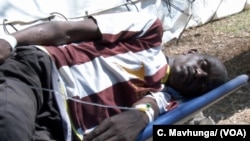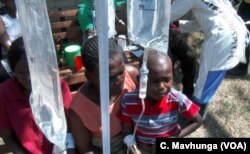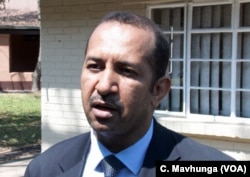Zimbabwe has declared a state of emergency in Harare following 20 deaths and more than 2,000 cases related to waterborne diseases such as salmonella, typhoid and cholera.
Zimbabwe's new health minister, Obadiah Moyo, on Tuesday told reporters that poor water supply, blocked sewers, and a failure to collect waste were making a cholera outbreak in the capital worse.
“The numbers are growing by the day and to date, there are over 2,000 cases, and there has been a total of 20 deaths. We are putting solutions to the problem. We have asked our partners from the United Nations to give us assistance. We are declaring an emergency for Harare. This will enable us to contain the cholera, typhoid and whatever is going on, to get rid of the problem as quickly as possible,” he said.
Moyo made the comments during a visit to a temporary cholera treatment camp in Harare.
He said some schools in the affected areas had been temporarily closed after two students died.
Mohamed Ag Ayoya is the United Nations Children’s Fund representative for Zimbabwe.
"We have already mobilized quite significant resources from the U.N. in general, UNICEF and WHO in particular. We are also talking to our partners on the ground, DFID, and others to mobilize more resources. We have also alerted our regional offices and headquarters because we have alerted our regional headquarters because we know this is a very serious issue, which will need quite huge investments to contain the outbreak. We are working very hard to help the government of Zimbabwe," he said.
In Budiriro, one of the most affected areas, people says they have yet to receive clean water. Raw sewage flows in the streets and 66-year old Jay Kanduru said he is angry.
He said they have been telling authorities to repair the old sewer pipes but they refuse. " We are tired," he said. "They don’t come fix their sewer pipes – they let the sewage flow. We now have to go to bars to relieve ourselves, he says. It has been like this for three months," said Kanduru.
A 2008 cholera outbreak in Zimbabwe lasted over a year and killed about 5,000 people. It was stopped only after international groups like United Nations agencies and USAID donated drugs and water treatment chemicals.








